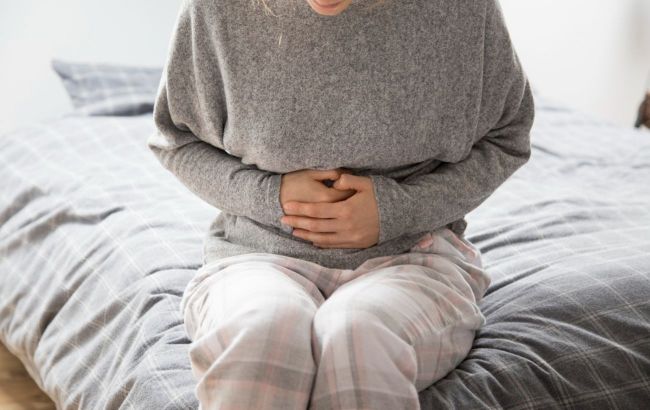Irritable bowel syndrome: How to reduce symptoms with diet
 How to reduce IBS symptoms (photo: Freepik)
How to reduce IBS symptoms (photo: Freepik)
Irritable bowel syndrome (IBS) along with other functional gastrointestinal disorders are very common in both children and adults.
Ukrainian dietitian discusses how dietary changes can alleviate symptoms of IBS.
How to reduce symptoms of irritable bowel syndrome (IBS)
Symptoms of IBS include spasms and abdominal pain related to the frequency and consistency of bowel movements. There may also be bloating, a feeling of incomplete bowel emptying, general weakness, etc.
Most patients with IBS notice a connection between their diet and certain foods that can exacerbate the symptoms of the disease.
The doctor explained what diet can be beneficial for such patients.
Low FODMAP diet
FODMAPs are carbohydrates that are not digested in the small intestine and are fermented by bacteria in the large intestine. They increase gas production, leading to bloating, pain, and diarrhea after consumption.
Restricting high-FODMAP foods for 2-6 weeks reduces symptoms of IBS. Then, gradually reintroducing such products into the diet can help identify which ones trigger exacerbation of gastrointestinal symptoms.
Here are the products that contain high levels of FODMAPs:
- Dairy products (milk, ice cream, cheese, yogurt)
- Some fruits and berries (peaches, watermelon, pears, mangoes, apples, plums, nectarines)
- Legumes (chickpeas, beans, lentils)
- High-fructose corn syrup
- Artificial sweeteners
- Wheat bread, cereals, and pasta
- Some vegetables (artichokes, asparagus, broccoli, onions, Brussels sprouts)
"Although this diet excludes certain fruits, vegetables, and dairy products, not all products from these categories need to be removed from the menu," says Oleh Shvets, a Ukrainian dietitian.
Low-FODMAP products that can be consumed while following this diet include lactose-free dairy products or their plant-based alternatives (such as rice or almond milk), fruits and berries (oranges, blueberries, strawberries, and grapes), eggs, lean meats (skinless chicken and turkey breasts), lean fish (such as cod and haddock), rice or quinoa, and vegetables (carrots, eggplants, green beans, pumpkin, zucchini).
Elimination diet
During this diet, certain foods are eliminated from the diet to track how IBS symptoms change.
Products that can trigger IBS symptoms include:
- Milk and ice cream
- Certain fruits and vegetables
- Alcohol
- Spicy foods
- Carbonated water with artificial sweeteners or high-fructose corn syrup
"You can try avoiding any product that, in your opinion, triggers symptoms," the doctor notes.
High-fiber diet
Adults should consume 22-34 grams of plant-based dietary fiber (fiber) per day, depending on gender and age. Soluble fiber is more beneficial in IBS. It is abundant in fruits, beans, and oats. Insoluble fiber is found in vegetables and grains. Many foods contain both types of fiber.
"High-fiber foods are nutritious and help prevent constipation. However, if bloating or gas occurs due to fiber intake, try gradually increasing consumption by about 2-3 grams per day," advises the doctor.
Low-fiber diet
High levels of fiber intake can worsen symptoms, leading to bloating and diarrhea in some individuals. However, a 2018 study showed that fiber consumption is associated with a lower risk of IBS.
The doctor advises that instead of reducing the amount of fiber in the diet, it is preferable to favor sources of soluble fiber found in berries, carrots, oats, and peas. Insoluble fiber is abundant in whole grains, nuts, tomatoes, green beans, broccoli, and zucchini.
Gluten-free diet
Gluten can trigger immune inflammation in the intestines of people with gluten intolerance, sometimes accompanied by IBS. In such cases, a gluten-free diet may alleviate symptoms.
It is advisable to exclude barley, rye, and wheat from the diet and observe whether the gastrointestinal condition improves. Gluten is found in bread, cereals, crackers, pasta, some sauces, malt vinegar, and beer.
Low-fat diet
A diet high in fat can exacerbate the course of IBS. Doctors typically advise reducing fat intake to around 27 grams per day.
Such a diet is also beneficial for the heart and may reduce discomforting symptoms in the intestines. It is advisable to focus on lean meats, fruits, vegetables, grains, and low-fat dairy products.
What foods to eat and which ones to avoid
The diet for IBS depends on the chosen diet, but among the general recommendations are:
Fruits and berries. Allowed - oranges, blueberries, strawberries, raspberries, grapes, kiwi. Peaches, watermelon, pears, mangoes, apples, plums, and nectarines should be limited. Consume berries in portions, not exceeding 50-60 grams per serving.
Vegetables. Allowed - carrots, eggplants, pumpkin. Should be limited - artichokes, asparagus, broccoli, Brussels sprouts, onions.
Legumes. Allowed - peas. Should be limited - chickpeas, beans, lentils. Sweeteners. Allowed - agave, stevia. Should be limited - sorbitol, xylitol, mannitol, high-fructose corn syrup.
Other products. Allowed - eggs, lean meats, oats. Should be limited - wheat products, dairy products, coffee, alcohol.
"Generally, it is considered beneficial to add berries, oatmeal, gluten-free products, lean meats, low-fat dairy products, and stevia to the menu," says the dietitian.
IBS symptoms can be exacerbated by caffeine, dairy products, alcohol, spices, whole grain products, fried food, and high-fructose corn syrup.
Flaxseed and oats can help alleviate constipation. Foods with anti-inflammatory potential - such as salmon, olive oil, and berries - are helpful during IBS flare-ups.
Adequate sleep, stress reduction, and regular physical activity also contribute to minimizing IBS symptoms.
Before choosing a diet, it's important to consult with your doctor.
Also read about when coffee intoxication can occur.
Earlier, we wrote about products that reduce the risk of diabetes, dementia, and cancer.
This material is for informational purposes only and should not be used for medical diagnosis or self-treatment. Our goal is to provide readers with accurate information about symptoms, causes, and methods of detecting diseases. RBС-Ukraine is not responsible for any diagnoses that readers may make based on materials from the resource. We do not recommend self-treatment and advise consulting a doctor in case of any health concerns.

